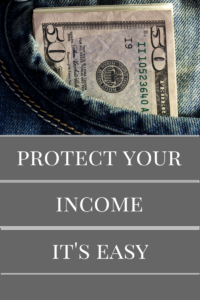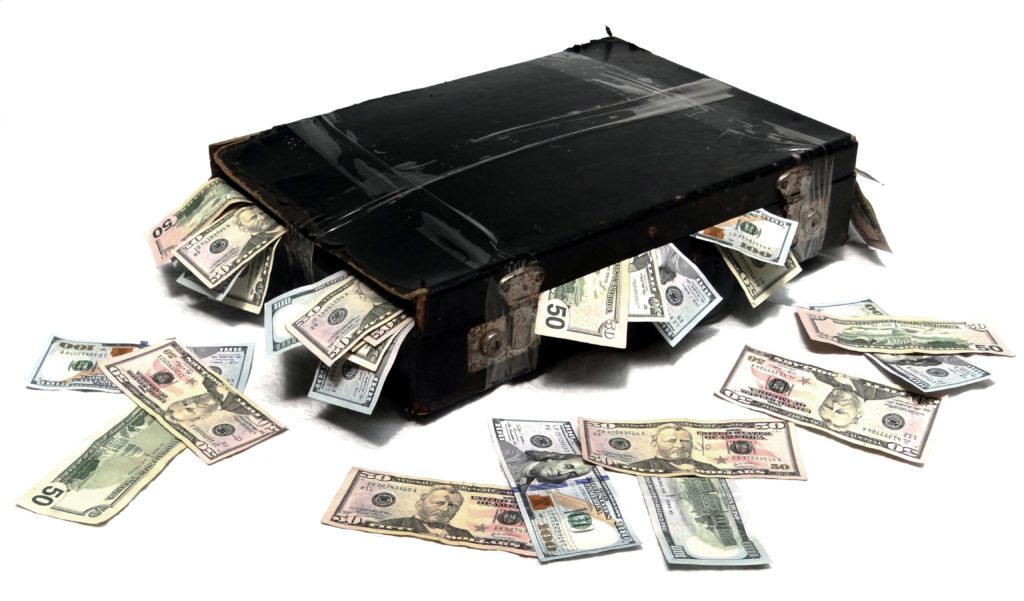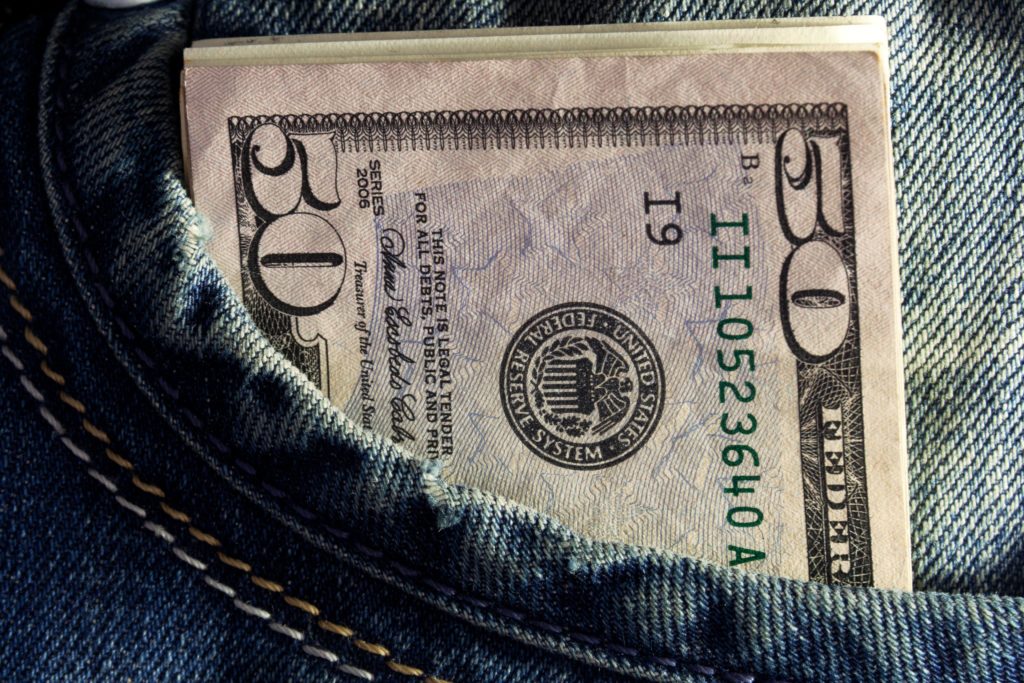Protect your income
This article is the second in a series of a six on financial security. The introduction to this series, “how to start a financial safety net,”
Growing up, this is the work ethic I was raise with: Work hard and be faithful to your employer. It was believed that if
you adhered to these practices, you would be able to live a comfortable life. It’s a “The leg bone is connected to the foot bone” kind of thing, and I believe that (for the most part) it was and continues to be true—even today. Of course, no employee has total control over the circumstances of employment. There are no guarantees that I won’t be laid off, downsized, become ill or injured. But, as a rule, being conscientious and industrious builds good will with the people who have the power to decide if you’ll continue to hold your job. Keeping a job is important. Employment yields the income on which financial security is based. What you do with your income influences how you will do should the flow be interrupted. Do everything you can to protect your income.
By protecting your income you protect your lifestyle. (If you lose your income, it’s only a matter of time before you lose your lifestyle.) Give it just a little thought; you don’t need me to list the myriad of parallels between the two.
Income = Lifestyle
If you lost your job today, how long could you sustain your present lifestyle? If you’ve been living paycheck to paycheck and have nothing in savings, you already know it probably wouldn’t be long: Your bills don’t stop coming just because money stops coming in.
A little bit of income protection—maybe
If you have a full-time job and are eligible for unemployment, that’s good news—at least for a little while. But, unemployment insurance was never meant to replace your income. It’s only supposed to be a stop-gap between jobs, and even then it’s conditional: Essentially, someone—your employer (the one that let you go???) or if not, hopefully, a review board—has to deem you worthy to receive it. Even then there is a limit on how long you can receive payments. In Illinois, where I live, the current limit for receiving unemployment payments is 26 weeks. There are similar limits nation-wide. Some states allow a few more weeks, other a few less (Florida only allows 12 weeks to new claimants.). The limits are based on what is assumed to be a reasonable amount of time for you to find a new job: Any job: Not necessarily one with pay equivalent to the one you lost. (Now, you tell me how often you hear of a mature person—teenage employment is a completely different issue—replacing a job quickly. I still read accounts about hundreds of applicants for a single position.)
More not-so-great news
In fact, I’d just call this bad news: Unemployment Insurance pays only a percentage of what you’d be earning at work. In Illinois it is 47% of your highest two reporting periods. Also, there’s a cap on the weekly amount you may receive. The percentages and other guides for calculating your weekly unemployment check vary from state to state, but they are easily obtained from internet sources. (Enter into the search engine: calculate my unemployment benefit in name your state. Searching for other—related—information is about as easy.)
Problems
Most people can’t possibly maintain their customary lifestyle in the event of a sudden, unexpected, 50% (or greater) cash inflow cut. What changes would you have to make if you lost half your income? Do you pay the gas/electric bill, or get groceries? (If you opt to pay the utility bill, how will you eat? If, instead, you choose to buy groceries, how do you cook when utilities are turned off for non-payment? As for visiting the doctor—forget it.) The challenges become endless. You just lost your lifestyle.
And the bad news just keeps coming
Here’s one more thing: Unemployment payments are taxable income. Ouch!!
Your two jobs
I’m not talking about punching a time-clock. These jobs have to do with making the most of the money you earn by working for pay. One, you need to be familiar with the Unemployment Insurance policies (the laws) in your state: Know the requirements and limits for receiving your benefits: Know what you are owed. You can check online or directly with the Unemployment Office of the state in which you are employed. Your second, the more important, job is to do something that will let you dodge the very real possibility of finding yourself in a dismal state.
The news gets better
You have the power to do something to protect yourself. Right now, ahead of possible difficult times, take charge of the one aspect of your job over which you absolutely do have control—what you do with your take-home pay. You can start saving money for the proverbial “rainy day”.
Savings = Success
Having money in savings is the key to protecting your lifestyle. Save now to give yourself a living “income” when pay is not coming in. That’s the solution to protecting the income/lifestyle dilemma, and that is good news.
It’s a fairly simple solution, and as with many simple solutions, it takes real work to implement.
In a few words
Experts say you should have three to six months of living expenses saved for emergencies.
In a few words, that’s the plan for a financial safety net. (“Building a Financial Safety Net” is the name of this series.) Personally, I feel like it should be one year. When it comes to hard times, there is no such thing as being over prepared. And, when hard times are over, having something left to build on will be so much more satisfactory than having to restart from ground zero. That said, simply having had any resources set aside to ease your way through a financial drought would be an advantage not available to most people.
Before unemployment strikes get ready
Start building your financial safety net now.
Be aware: You’re not going to get it together all at once. You cannot dedicate your total income towards the future. You fund your current needs with the money you’re earning. Future financial security is one of those needs. “Saving for a rainy day” needs to be a category in your budget. You’ll build your financial safety net bit by bit—paycheck by paycheck. So, find ways to start saving. I’ve got some suggestions:
Lower your monthly expenses and save the difference
The average family is living paycheck to paycheck and rarely does more than finish even. In order to save enough money to see you through a lengthy period of unemployment, adopt a frugal lifestyle now. Examples of living frugally are couponing, eliminate debt, and reduce your car insurance. This list is a good start, but not the only ways to save money. If you’re determined to build a financial safety net, you’ll find ways to cut your expenses. The recovered money can be dedicated to that emergency fund.
Earn a little more money
There are times when legitimate demands of life take all the money we’re bringing in. You’re already living frugally? There truly is nothing you can cutback, downsize, or eliminate from your budget? (Note: If you don’t have a budget, there is no way for you to know for sure that you are at this point.) If you simply need more money so you can start saving (or saving more) you could get a part time job or pet setting sell blood plasma. If you look for ways to earn extra-money, you will find them. Again, put this money towards your financial safety net.
Budget
Money should always plan attached to it. Your financial plan needs to include money dedicated to long-term/emergency saving. If you don’t have a well-funded emergency account, any extra money you earn—or find serendipitously—needs to be put into one. Don’t fall into the trap of spending money just because you have it. Think of long-term benefits over immediate gratification. A plan (a budget) can allow you to have money when you really need it: But, you have to work the plan before it’s needed.
When the day comes
This section assumes you’ve been preparing a while for a time of unemployment. It assumes you’re receiving Unemployment Benefits. (If you’ve been denied those, your financial safety net may well be the sole source of your livelihood until you find another job.)
So … As long as you collect unemployment pay, supplement it with funds your savings. You should not (after supplementing your unemployment) allow yourself more than you would receive from a normal paycheck. The only exceptions would be those you cannot avoid, like a car repair; you probably need to use you car in the quest for employment. (Of course, if you have been living on a budget, you may have a fund designated for car repairs.) Take as little as possible out of your emergency savings. That means no trips to Disney Land. A frugal mindset requires, that even if you have been saving for such a trip, you suspend your plans until your financial status is more secure.
If your Unemployment Benefits run out, you’ll have to start living off you savings, but don’t spend more than you absolutely have to.
Gravy
Someone is bound to ask, “And, what happens if ‘that day’ never comes?” Answer: You’re very happy!
Should you remain well-employed, these funds will (someday) make a nice addition to your retirement fund.
Conclusion
By protecting your income you’re really protecting your lifestyle. When disaster strikes we need a financial plan that allows us to maintain and recover with minimal damage. That requires a financial safety net: A plan that keeps the cash inflow coming. Most working Americans live paycheck to paycheck. So, how can they manage living—let alone have a lifestyle—when unemployment hits? Unemployment Benefits are a short-term stop-gap that often falls really “short.” The cycle can be broken by planning where your money will go (Make a budget.). Funding a financial safety net should be a major category of that plan. Unless you have you have money set aside for the “rainy day,” you just won’t make it. Live frugally and save the difference. Adding in a part-time job and saving the income from that job can boost your savings dramatically. The greater the funds you have dedicated to this type of emergency the more likely you are to ride out a period of unemployment without have lost anything.
Protect your income protect your way of life.
Read the next article how to supplement your health care
Never miss another post follow me on Facebook



